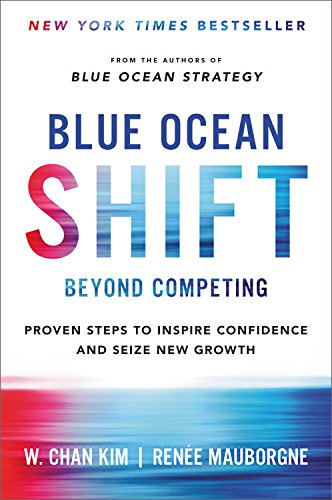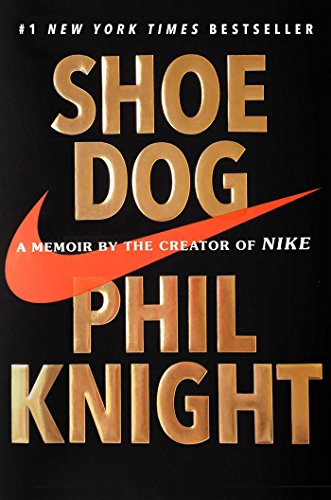Books I have enjoyed, and that I recommend to you.
Jony Ive: The Genius Behind Apple’s Greatest Products
by Leander Kahney
In 1997, Steve Jobs discovered a scruffy British designer toiling away at Apple’s headquarters, surrounded by hundreds of sketches and prototypes. Jony Ive’s collaboration with Jobs would produce some of the world’s most iconic technology products, including the iMac, iPod, iPad, and iPhone. Ive’s work helped reverse Apple’s long decline, overturned entire industries, and created a huge global fan base. Yet little is known about the shy, soft-spoken whiz whom Jobs referred to as his “spiritual partner.”
Leander Kahney offers a detailed portrait of the English art school student with dyslexia who became the most acclaimed tech designer of his generation. Drawing on interviews with Ive’s former colleagues and Apple insiders, Kahney “takes us inside the creation of these memorable objects.” (The Wall Street Journal)
Blue Ocean Shift: Beyond Competing - Proven Steps to Inspire Confidence and Seize New Growth
by W. Chan Kim & Renée Mauborgne
Blue Ocean Shift is the follow up to Blue Ocean Strategy. Drawing on more than a decade of new work, Kim and Mauborgne show you how to move beyond competing, inspire your people's confidence, and seize new growth, guiding you step-by-step through how to take your organization from a red ocean crowded with competition to a blue ocean of uncontested market space. By combining the insights of human psychology with practical market-creating tools and real-world guidance, Kim and Mauborgne deliver an excellent guide to shift yourself, your team, or your organization to new heights of confidence, market creation, and growth. They show why nondisruptive creation is as important as disruption in seizing new growth.
Blue Ocean Shift is packed with all-new research and examples of how leaders in diverse industries and organizations made the shift and created new markets by applying the process and tools outlined in the book. Whether you are a cash-strapped startup or a large, established company, nonprofit or national government, you will learn how to move from red to blue oceans in a way that builds your people's confidence so that they own and drive the process.
Blue Ocean Strategy: How to Create Uncontested Market Space and Make the Competition Irrelevant (updated version)
by W. Chan Kim & Renée Mauborgne
In this perennial bestseller, which sold over 3.6 million copies worldwide, INSEAD professors W. Chan Kim and Renée Mauborgne challenge everything you thought you knew about the requirements for strategic success. Recognized as one of the most iconic and impactful strategy books ever written, Blue Ocean Strategy, argues that cutthroat competition results in nothing but a bloody red ocean of rivals fighting over a shrinking profit pool. Based on a study of 150 strategic moves, the authors argue that lasting success comes not from battling competitors but from creating “blue oceans”―untapped new market spaces ripe for growth.
Blue Ocean Strategy presents a systematic approach to making the competition irrelevant and outlines principles and tools any organization can use to create and capture their own blue oceans. Consider this your guide to creating uncontested market space―and making the competition irrelevant.
To learn more about Blue Ocean Strategy, visit blueoceanstrategy.com. There's a tonne of resources you need―from ideas in practice and cases from government and private industry, mobile apps,etc.
Shoe Dog - A Memoir by the Creator of Nike
By Phil Knight
In this candid and riveting memoir, Nike founder and board chairman Phil Knight shares the inside story of the company’s early days as an intrepid start-up and its evolution into one of the world’s most iconic, game-changing, and profitable brands.
I enjoyed this book immensely, as many of Phil Knight's experiences reminded me of my first job at Puma as a Product Manager, and when I co-founded the Gola sportswear company.
Knight details the many terrifying risks he encountered along the way, the crushing setbacks, the ruthless competitors, the countless doubters and haters and hostile bankers—as well as his many thrilling triumphs and narrow escapes. Above all, he recalls the foundational relationships that formed the heart and soul of Nike, with his former track coach, the irascible and charismatic Bill Bowerman, and with his first employees, a ragtag group of misfits and savants who quickly became a band of swoosh-crazed brothers.
Young, searching, fresh out of business school, Phil Knight borrowed fifty dollars from his father and launched a company with one simple mission: import high-quality, low-cost running shoes from Japan. Selling the shoes from the trunk of his Plymouth Valiant, Knight grossed eight thousand dollars that first year, 1963. Today, Nike’s annual sales top $30 billion. In this age of start-ups, Knight’s Nike is the gold standard, and its swoosh is more than a logo. A symbol of grace and greatness, it’s one of the few icons instantly recognized in every corner of the world. A truly inspiring entrepreneurial story.
The Lean Startup: How Today's Entrepreneurs Use Continuous Innovation to Create Radically Successful Businesses
by Eric Ries
Most startups fail. But many of those failures are preventable. The Lean Startup is a new approach being adopted across the globe, changing the way companies are built and new products are launched.
Eric Ries defines a startup as an organization dedicated to creating something new under conditions of extreme uncertainty. This is just as true for one person in a garage or a group of seasoned professionals in a Fortune 500 boardroom. What they have in common is a mission to penetrate that fog of uncertainty to discover a successful path to a sustainable business.
The Lean Startup approach fosters companies that are both more capital efficient and that leverage human creativity more effectively. Inspired by lessons from lean manufacturing, it relies on “validated learning,” rapid scientific experimentation, as well as a number of counter-intuitive practices that shorten product development cycles, measure actual progress without resorting to vanity metrics, and learn what customers really want. It enables a company to shift directions with agility, altering plans inch by inch, minute by minute.
Rather than wasting time creating elaborate business plans, The Lean Startup offers entrepreneurs - in companies of all sizes - a way to test their vision continuously, to adapt and adjust before it’s too late. Ries provides a scientific approach to creating and managing successful startups in a age when companies need to innovate more than ever.
“A book is a device to ignite the imagination.”




